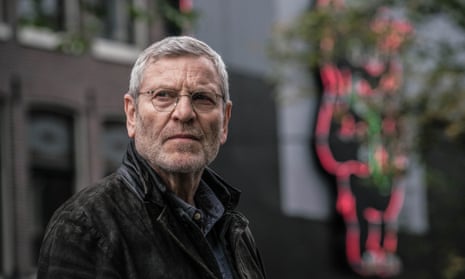Baptiste (BBC1) is not the man he was. “I’m not the man I was,” he tells Marta, the police commissioner in Amsterdam, and also an ex, who still goes doe-eyed at him from across the table. Marta needs the former detective’s help with the case of a missing girl. “I am not the man I was,” he later tells Edward Stratton, whose niece, Natalie, is the girl who has disappeared. I assume we are to use our own finely honed detective skills to work out that perhaps Julien Baptiste is not the man he was.
We first met the man he was in The Missing, the Williams brothers’ masterful thriller, which, over its two series to date, unravelled the pain and trauma of losing a child and spun it into tense, complex mysteries. Viewers will remember that Baptiste had a gung-ho, blaze-of-glory attitude in the 2016 instalment, owing to a potentially fatal brain tumour, for which he was refusing a life-saving operation. In this spinoff-cum-sequel, he has been through the op, now sees his doctor every six months and has a clean bill of health. Given the amount of softly spoken yet profound advice he doles out, he seems much more peaceful than the grizzled French detective we once knew. Why? Because he is not the man he was, of course.
Still, his long-suffering wife Celia points out that she knows that look. When Marta asks Baptiste to help frazzled Englishman Stratton look for his niece, a sex worker who may have disappeared into Amsterdam’s red light district, possibly with the involvement of a Romanian criminal gang, he cannot leave it alone. As with The Missing, there is no suggestion that this case is going to be simple, nor anything less than gruesome. The story opens with an impractically tiny bit of plastic underneath a body, and the revving of a chainsaw. All signs point to a Scandi-noir-style hour of unflinching violence under grey skies, but, aside from the scene involving the creative use of a pool ball, this opener is more about laying a trail of breadcrumbs for us to follow. It takes a tour of Amsterdam’s criminal underground via transgender sex workers, racketeering and trafficking, and packs in at least one sizable twist that ensures it will be difficult to turn off before finding out what happens next. That’s the way the Williams brothers, who also wrote ITV’s Liar, work. It is as effective a tool as it ever was, and the ending here is a hook dangled with expert efficiency.
This is an hour of big, actorly performances. As Baptiste, Tchéky Karyo speaks in whispered-wisdom platitudes, occasionally sounding like a fortune cookie has got stuck in his throat. “She believed she was taking drugs, but they were taking her,” he says of his daughter’s addiction, like a zen Jeremy Kyle. Those who saw Tom Hollander going for it in Bird Box are getting a more low-key turn here, but it retains some of that sweaty creepiness and uncertainty – he really is very good at keeping you guessing. God’s Own Country star Alec Secareanu, too, channels his dark side as Constantin, wielder of the chainsaw, who is wise to Baptiste’s interest in his business propositions, and has little patience for allowing himself to be watched.
I loved The Missing, and I loved Baptiste in The Missing. It was a bleak series, but it was clever, and there was a humanity to it that made the suffering seem, if not worth it, then at least bearable. Baptiste’s tenacity and vision was a huge part of that. So far, out on his own, he feels more like any detective at the heart of a functional crime thriller, borrowing moods from here and there, rather than the star of a standalone classic. There is a steady familiarity to it all, and one of the big reveals seems a little easy and also signposted from a mile away. It reminded me of 90s Prime Suspect, which is not a bad thing, but nor is it especially revolutionary to keep doing that today. “I’m slower than I used to be, unfortunately,” Baptiste tells Kim, a cafe owner and Rita Hayworth fan who is central to the mystery. Hopefully he will find a little more energy as the case ramps up.

Comments (…)
Sign in or create your Guardian account to join the discussion